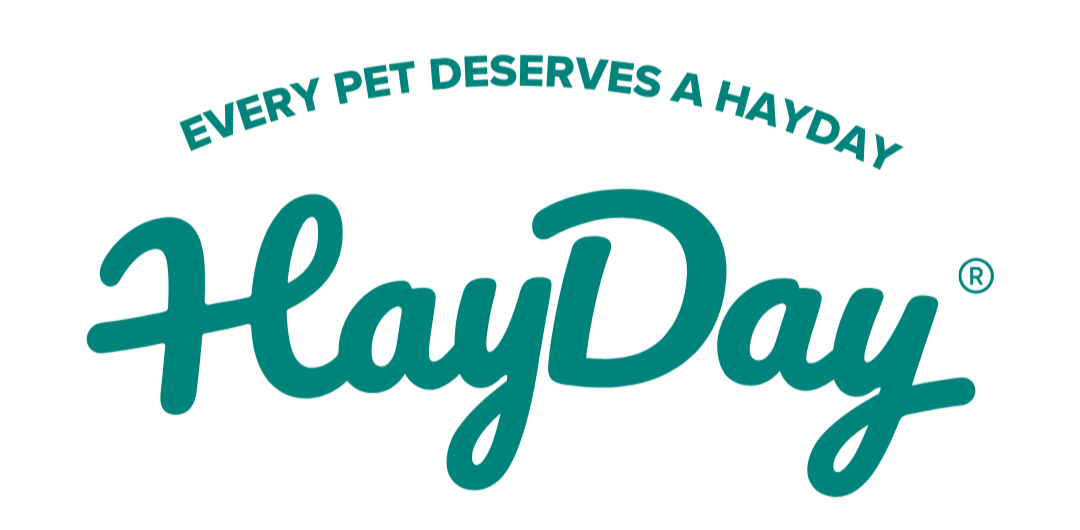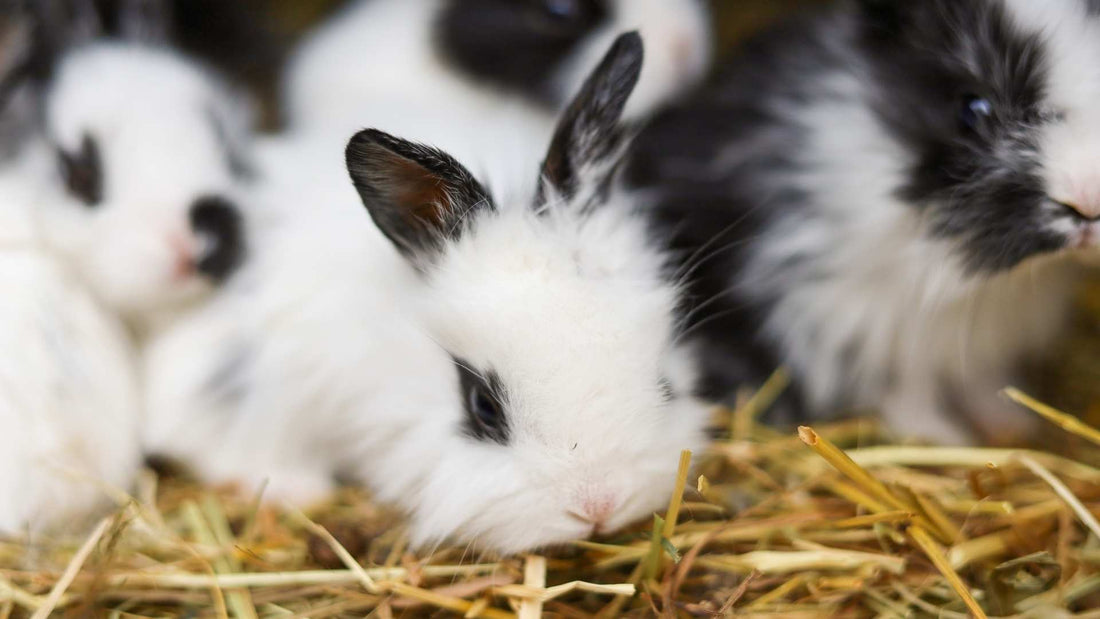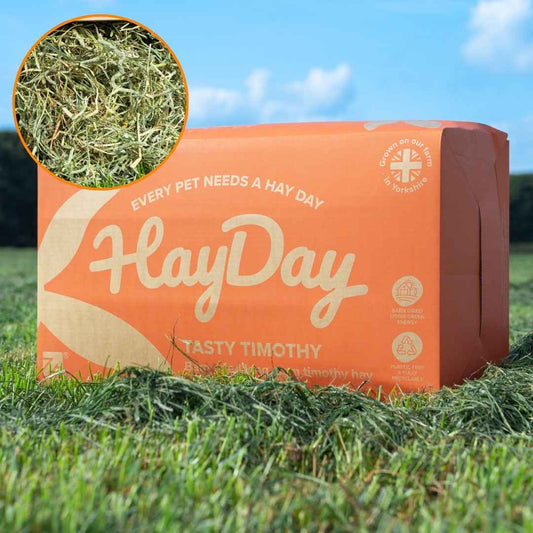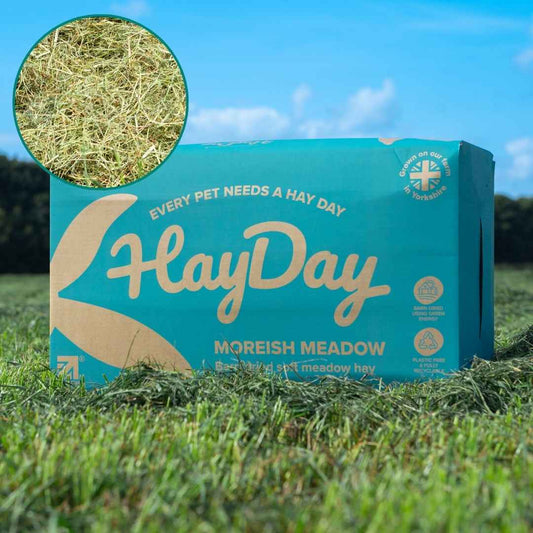Here at HayDay, we love helping you raise happy, healthy baby rabbits - which are also known as kits. Feeding them the right foods at the right time helps them grow strong and healthy,
Our expert care guide will walk you through what to feed baby rabbits, how to care for them, and how to spot signs of health problems.
We’ll also talk about how to change their diet as they grow, ways to keep them active and happy, which hay is best and to answer some common questions. Let’s get started!

Always Milk for Newborn Bunnies!
Newborn baby rabbits need their mother’s milk for the first two weeks to grow strong and healthy. This milk is full of nutrients that help their bodies and immune systems develop. If their mum can’t feed them, you’ll need to take extra care to keep them healthy.
In this case, use a kitten milk replacer (never offer a bunny cow’s milk!) and feed them 2-5 ml, split across two or three feedings a day, using a small syringe or pet nurser bottle.
Keep kits warm (around 23-26°C) during feeding to make them feel cosy, like in their mum’s nest. Handle them gently and keep their bedding clean and dry to avoid infections. Weigh them every day - they should gain about 5-10 grams daily.
If they’re not gaining weight, seem sleepy, or have a bloated belly, contact an exotic vet right away, as newborn kits are very delicate.
Note: Typically, most baby rabbits should be around 8 weeks old before they can be taken home as a pet.
Starting Solid Foods (2-4 Weeks)
When kits are 2-3 weeks old, they start nibbling on their mum’s cecotropes, which are soft droppings that help their tummies build healthy bacteria. This is also when you can introduce solid foods while they still drink milk.
Give them small amounts of alfalfa hay, which is a legume rather than a grass hay, which is higher in calcium and protein to support health and development in baby kits. You should also put fresh water in a shallow dish.
It is essential to keep their living area clean to prevent sickness. Let them explore their surroundings gently to build their strength, but avoid any loud noises that might scare them.
Watch for runny or soft poop, which can be an indication that they’re getting too much milk or the wrong food. Kits should be active and curious - if they seem weak or aren’t eating, see a vet.
HayDay’s Coarse & Crunchy Alfalfa is a great choice for young and growing rabbits.
Eating More Solids (4-8 Weeks)
By 4 weeks, kits are drinking less milk and eating more solid foods. This stage is important for building strong digestion and healthy teeth.
Offer unlimited quantities of alfalfa hay and limit to around an egg cup (25-30g per 450g of bodyweight) of pellets initially, trying to encourage more emphasis on hay intake in the early stages. Our nutritionist Briony best recommends introducing vegetables around 12 weeks as the risk of digestive upset or bloat is still quite high before this point.
The action of chewing hay helps keep their teeth healthy, which is important because rabbit teeth never stop growing. Make sure they have a safe space to hop and play to help them grow strong. Check their teeth for signs of overgrowth, like uneven or long teeth, or drooling, which could mean dental problems.
Changing to a Grown-Up Diet (12-18 weeks)
When kits reach 8-12 weeks, they’re becoming juvenile rabbits and need to transition to a diet that matches their maturing bodies. We would recommend a gradual transition from alfalfa hay to our premium timothy hay between 3 to 6 months, which is better for their digestion as they grow.
Reducing by 25% of alfalfa hay at this point and then each month a further 25% (i.e. full timothy hay by 6 months). There are some small breeds which may mature slightly quicker, in which case we might reduce the alfalfa hay more quickly but for larger breeds more slowly is often preferable.
Slowly add more greens, like cilantro or kale, but only one new type at a time to check for tummy upset. Give them a big space to run and play, as exercise keeps them healthy.
Look out for signs like not eating, losing weight, or inconsistent looking poop (too small, hard, or watery), which could mean digestive issues or stress.
Food for Adult Rabbits (6 Months and Up)
By 6 months, your rabbits are adults, and their diet should focus on keeping them healthy, not growing. Offer unlimited amounts of different types of hay - such as timothy and meadow hay - as the main component of their diet (80-90%). A healthy, adult diet should consist of:
-
High quality hay - such as timothy, meadow, ryegrass or oat hay
-
Rabbit safe pellets
-
Leafy greens and vegetables
-
Water
Avoid giving too many sugary foods like carrots or fruits, as these can make them unwell or lead to obesity. Make sure they always have fresh water in a clean bottle or bowl to stay hydrated. Keep their living area clean and give them lots of playtime and attention to keep them mentally and physically happy.
Watch for signs of obesity (if you can’t feel their spine) or sudden weight loss, which could mean health problems.
Check their bottom for dirty fur, which might show digestive or hygiene issues, and schedule regular vet visits.
Which fresh fruits and vegetables are safe for 12 weeks and Up?
Safe vegetables (12 weeks +)
Leafy greens are ideal for baby rabbits. Safe options include:
-
Carrot tops
-
Dandelion leaves
-
Kale
-
Spinach
-
Spring greens
-
Herbs (e.g., parsley, basil, cilantro)
-
Watercress
-
Broccoli greens
Offer these vegetables in moderation, i.e. one new green at a time, to monitor their response and avoid digestive upset.
Safe fruits (12 weeks +)
Fruits should be given sparingly to baby bunnies due to their high sugar content. Offer fruits as a treat no more than once a week.
Fruits should only be fed once digestion is stable on hay and a small variety of leafy greens. Safe fruits include:
-
Apple (seedless)
-
Banana
-
Strawberries
-
Blackberries
-
Raspberries
-
Cranberries
-
Cherries (seedless)
-
Melon (without rind/seeds)
-
Grapes
-
Nectarine (always remove pit/stone)
Helping Their Teeth and Keeping Them Happy
Feeding the right foods does more than keep their bellies full - it helps support their digestion and dental health.
Rabbits have teeth which are known as hypsodont - which means they erupt continuously throughout their life, so chewing on hay and veggies helps keep them in great condition.
To keep your bunnies from getting bored, offer fun enrichment toys like cardboard tunnels or hay-stuffed balls to keep them entertained. Hiding pellets or greens within their hay makes eating like a fun game, which they love.
Check their teeth regularly for signs of overgrowth or misalignment, and watch for behaviour changes like loss of appetite or lack of exercise, which could mean they’re stressed or unwell.
Things to Avoid
To keep your baby rabbits healthy, avoid some common mistakes. When feeding rabbit safe pellets, it is key to not overfeed them, as this can lead to weight gain or tummy problems.
Always introduce new foods slowly to avoid diarrhoea or bloating - this should be gradually, over a period of 7 to 14 days.
Stay away from foods like iceberg lettuce, cabbage, or sugary treats, as these can upset their stomachs.
If you notice any signs of illness: like not eating, tiredness, or inconsistent poop it is important to seek the advice of a veterinarian immediately.
Frequently Asked Questions
How often should I clean my baby rabbit’s cage?
Clean their cage or enclosure at least once a week, but spot-clean daily to remove soiled bedding or uneaten food. A clean space prevents infections and keeps kits healthy.
What if my baby rabbit won’t eat hay?
Some kits are picky at first. Try mixing different types of hay, like HayDay’s alfalfa and timothy for a diverse diet. If they still won’t eat, check with a vet to rule out health issues.
Can baby rabbits have treats?
Kits under 12 weeks shouldn’t have treats, as their tummies are too sensitive. Instead of starting with fruit, you should offer a small range of vegetables as these tend to be lower in sugar and less likely to cause any digestive upset.
After 12 weeks, offer small amounts of safe fruits (see list above) but only once or twice a week to avoid tummy upset.
How do I know if my bunny is stressed?
Stressed bunnies might hide, stop eating, or act aggressively. Loud noises and sudden movements can cause stress. Provide a quiet, safe space and lots of enrichment to keep them calm and happy.
Final Thoughts
Raising baby rabbits is a rewarding adventure, and at HayDay, we’re here to help you every step of the way.
By feeding them the right foods like milk for newborns, alfalfa hay for young kits, and timothy hay for adults, you’ll help them grow strong and healthy.
Always watch for signs of health problems and act quickly if something seems wrong. With HayDay’s high-quality hay and forage, your bunnies will hop into a happy, healthy life!
Relevant Links
Best Types of Hay for Rabbits - HayDay HQ
Enrichment Ideas for Rabbits - HayDay HQ





